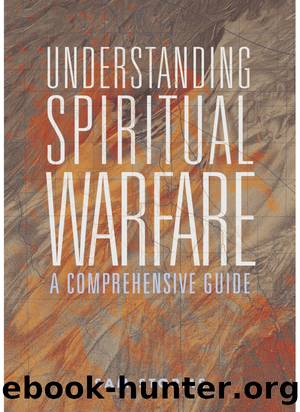Understanding Spiritual Warfare by Sam Storms

Author:Sam Storms [Storms, Sam]
Language: eng
Format: epub
Publisher: Zondervan
Published: 2021-03-02T00:00:00+00:00
Curses
One often also hears of an appeal to someone being cursed, and that somehow led a person to being demonized. One of the problems in discussing curses is the failure of most people to define precisely what is meant by the term. Although curses were most often verbalized, biblical curses have little if anything to do with modern profanity. Rather, to curse is to call down or send forth, from a supernatural source, calamity, trouble, chronic harm, or some other form of adversity upon another person or object. It is to speak evil of another person (hence, malediction or imprecation) with a view to inflicting injury (both physical and spiritual).8
Another problem in discussing curses is the misapplication of certain biblical texts. For example, appeal is often made to Galatians 3:13ââChrist redeemed us from the curse of the law by becoming a curse for usâfor it is written, âCursed is everyone who is hanged on a tree.â â The problem is that this text and the Old Testament passages on which it is based all refer to divine judgment or the penal consequences of sin, not demonic attack. Leviticus 26 and Deuteronomy 27â28 are devoted to articulating the grounds on which God will âcurseâ as well as âblessâ a person. Clearly, to be the recipient of a curse in this context means you come under divine judgment. God sends calamity or disaster or punishment in one form or another because of disobedience. Likewise, to be the recipient of a blessing is to experience his favor, his bounty, prosperity, and the like. When Jesus is said to have redeemed us from the curse by becoming a curse for us, the meaning is that he has suffered, in our place, the righteous wrath of God that we justly deserved. Therefore, Christians are no longer subject or vulnerable to a âcurseâ in that sense of the term.
In Joshua 6:26 and 9:23, a curse is pronounced by Joshua on both Jericho and Gibeon. But again, in both cases this appears to be a calling down of divine judgment, not demonic harm. In 1 Samuel 17:43, we see that pagan people in ancient times (in this case, Goliath) believed that curses (calamity) were the work of their gods. Spoken curses were thought to possess a power that derived from whatever deity they served. A curse was thought to trigger the release of malevolent spiritual energy toward the person or the object being cursed (see 2 Samuel 16:5â12).
The question remains: Does the Bible speak about demonic curses? Do we read in Scripture of anyone invoking or calling down or sending forth a demonic being to bring pain and problems, harassment and harm, to another person? This would appear to be what the Moabite king Balak asked Balaam to do regarding Israel. God himself forbids Balaam from cursing Israel: âyou shall not curse the people, for they are blessedâ (Num. 22:12). Although no mention is made of demonic spirits being involved, it is reasonable to think that they
Download
This site does not store any files on its server. We only index and link to content provided by other sites. Please contact the content providers to delete copyright contents if any and email us, we'll remove relevant links or contents immediately.
| Baptist | Book of Common Prayer |
| Calvinist | Episcopalian |
| Inspirational | Lutheran |
| Methodist | Pentecostal & Charismatic |
| Presbyterian | Quaker |
| Seventh-Day Adventist | Shaker |
| Theology |
Fangirl by Rainbow Rowell(9231)
How to Bang a Billionaire by Alexis Hall(8146)
Wonder by R. J. Palacio(8101)
The Thirst by Nesbo Jo(6934)
The Space Between by Michelle L. Teichman(6932)
Assassin’s Fate by Robin Hobb(6200)
Wiseguy by Nicholas Pileggi(5771)
The Night Circus by Erin Morgenstern(5217)
Paper Towns by Green John(5181)
The Kite Runner by Khaled Hosseini(5170)
Bittersweet (True North #1) by Sarina Bowen(4843)
Gerald's Game by Stephen King(4642)
Too Much and Not the Mood by Durga Chew-Bose(4338)
Pillow Thoughts by Courtney Peppernell(4273)
Goodbye Paradise(3802)
Twelve Days of Christmas by Debbie Macomber(3560)
Good by S. Walden(3549)
The Rosie Effect by Graeme Simsion(3461)
The Cellar by Natasha Preston(3335)
